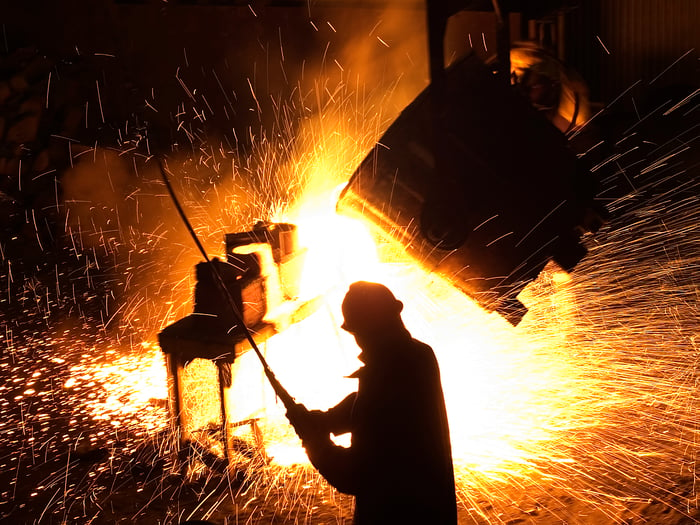Nucor (NUE 3.54%) is a Dividend King with 50 years' worth of annual dividend increases behind it. You don't put up a streak like that by accident. There's been a big focus on growth at this giant U.S. steel mill over the past five decades. Growth still plays a prominent role, but investors need to keep the broader economic backdrop today in mind as they assess Nucor. There's not much to worry about -- and here's why.
Giant Nucor always has giant plans
Nucor is one of the largest and most diversified steel makers in North America. It didn't start that way, of course. It built its industry position over time as it expanded its fleet of electric arc mini-mills. These steelmaking operations are more flexible than blast furnaces, an older technology that has huge operating costs even when steel demand is low. Electric arc mini-mills, to simplify things greatly, can be ramped up and down more easily with demand.

Image source: Getty Images.
That has allowed Nucor the benefit of wider margins and more consistent profitability through the business cycle. Notably, steel is a highly cyclical sector given how important the product is to the economy, from construction to product fabrication. That's important because Nucor tends to invest in its business through the cycle, often favoring industry downturns for investment. In that way, it ensures that it comes out of the downturn a stronger company. Management likes to discuss producing higher highs and higher lows, which basically indicates a broad uptrend despite the cyclical nature of the industry.
Between 2020 and 2022, the company spent roughly $5 billion on capital investments along with $5.1 billion on acquisitions. Looking forward, the company expects full-year 2023 capital spending to be around $2.4 billion, down from $3 billion, with the difference pushed into 2024.
In 2024, and maybe for a few years beyond that, capital spending is likely to be elevated because of a number of big projects in the works, including a new mill in 2025 for which the groundbreaking ceremony was held in August this year. Building steel mills, as you might expect, is expensive, and that new construction project is just one of many investments that Nucor has going on right now.
Nucor has a rock-solid balance sheet
The company's spending plans have to be couched in a very difficult environment when it comes to raising capital. Simply put, debt costs a lot more money today because interest rates have risen dramatically over the past year or so. That increases the importance of balance sheet strength for capital-intensive companies like Nucor. Nucor has a long history of ensuring that its balance sheet is in top-notch shape.
NUE Debt to Equity Ratio data by YCharts
In fact, as the chart above highlights, Nucor's debt-to-equity ratio is the lowest it has been in a decade. From that perspective alone, it is in a great position to handle the ongoing expense of investing in its business. But the story gets even better.
At the end of the third quarter, Nucor had $36 million of short-term debt and $6.6 billion of long-term debt. But here's the real key to the entire story: Juxtaposed against the debt is $6.7 billion in cash. That means that net debt, which is basically debt minus cash, is zero (technically there's a surplus of cash to the tune of around $50 million). Overall, the company has more than enough money to keep spending on whatever it likes, even if the economy sinks into a recession.
Add to this that the steel maker has zero drawn on a $1.75 billion revolving credit facility. That means there is ample access to a quick cash infusion if it is needed. Nucor is strongly positioned to take on whatever comes its way, financially speaking, while continuing to build for the future.
Prepared for the future and today
Nucor has many positives as a business, but right now one of the most notable is a balance sheet that just won't quit. Having zero net debt is impressive, but even if that's not good enough, it has a lifeline to draw on in the revolving credit facility. If there's a recession, Nucor's steel business will suffer, but its ability to invest for higher highs and higher lows doesn't look like it is at any risk whatsoever.






